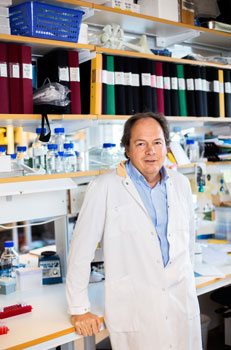Oct 9 2013
The Knut and Alice Wallenberg Foundation will give a little over SEK 16 million to the development of new, highly-efficient mucosal vaccines.

The vaccines will be drinkable or given as a nasal spray. Professor Nils Lycke at MIVAC at the Sahlgrenska Academy will in cooperation with researchers at Chalmers University of Technology and Lund University, combine technologies to develop the next generation of effective mucosal vaccines based on immunomodulation and cell-targeted nanoparticles.
According to world-health organizations, vaccination programs against the most serious infectious diseases represent the single-most important measure to improve global health and prevent debilitating disease. However, as most vaccines are injected and given by highly-trained healthcare personnel they are more difficult to administer in many parts of the world and the use of syringes, which may be reused, increases the risk for blood born contamination and spread of infection.
Costly and difficult
Also traditional mass vaccination in case of pandemic spread of infection, as for example with influenza, is very costly and difficult to undertake with traditional vaccines.
Mucosal vaccines, drinkable or nasal spray vaccines, have many practical advantageous, but few mucosal vaccines are commercially available today. This is because mucosal vaccines need powerful adjuvants and finding effective formulations that protect the vaccine components from degradation in harsh mucosal environments, such as the gut intestine.
Critical component
The adjuvant is the critical component of most vaccines that greatly enhances the immune response. For mucosal vaccines traditional adjuvants are not effective. Another advantage of mucosal vaccines is that the immune defense is located to the mucosal membranes that are the port of entry for most pathogens, including tuberculosis, influenza and HIV.
Next generation of mucosal vaccines
The research team has received funding from the Foundation to develop the next generation of effective mucosal vaccines based on their expertise in vaccine adjuvant and lipid nanoparticle research.
“We are now taking a unique and pioneering step towards a universal platform for mucosal vaccines by developing a new targeted lipid nanoparticle vaccine that combines knowledge from different disciplines,” says Nils Lycke.
Conceptually new approach
The team of researchers to undertake the project are professors Nils Lycke and Mary-Jo Wick at the Sahlgrenska Academy, William Agace at Lund University, Fredrik Höök and Marta Bally at Chalmers.
The research group will take a conceptually new approach to combining effective adjuvants with lipid nanoparticles to direct these complexes to the dendritic cells in the mucosal membranes.
Next generation of mucosal vaccines
These cells are the key target for the next generation of mucosal vaccines and responsible for initiating vaccine immune responses. The researchers have complementing expertise to solve the problems of how to combine all the expected properties of the mucosal vaccine in one particle.
“Thanks to a flexible particle design, and extensive experience with a patented adjuvant system we hope to be successful in our efforts” says Nils Lycke. If successful, the next generation of mucosal vaccines will have a major impact not only on vaccine prevention of infections, but also on global health ” says Nils Lycke.
Unique idea
“The idea is unique in several respects. No one has previously combined these components in a particle and no one has, in a structured manner, optimized the lipid particles to make mucal inoculations effective.”
The research project brings together four internationally successful research leaders with expertise in immunology, nano-biotechnology and vaccine development.